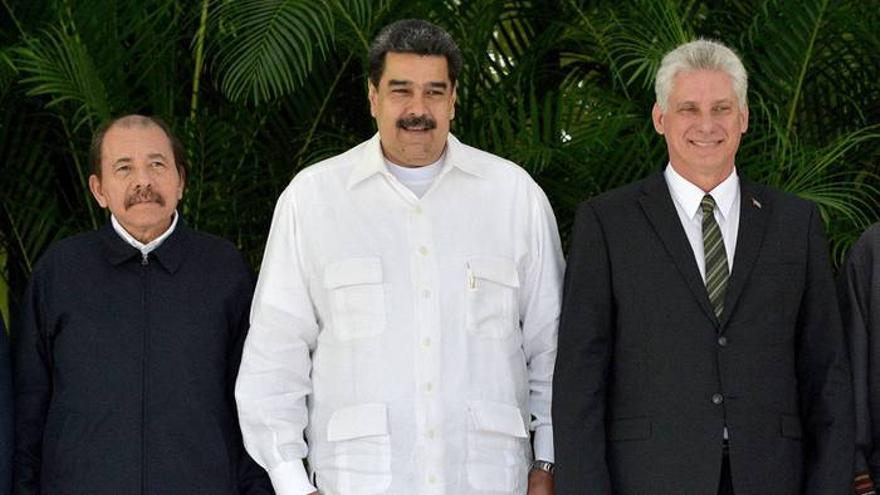
![]() 14ymedio, Yunior García Aguilera, Madrid, 5 April 2023 — That April 19, 2018, when deputies had to “elect” the president of the Republic, there was only one name on their ballots aspiring to the position. Raúl Castro himself cleared away all doubts by declaring that his appointment was not a coincidence, that it was planned and foreseen by the Party’s leadership. Díaz-Canel was the only survivor of a dozen “test-tube” leaders who had been training to inherit the throne.
14ymedio, Yunior García Aguilera, Madrid, 5 April 2023 — That April 19, 2018, when deputies had to “elect” the president of the Republic, there was only one name on their ballots aspiring to the position. Raúl Castro himself cleared away all doubts by declaring that his appointment was not a coincidence, that it was planned and foreseen by the Party’s leadership. Díaz-Canel was the only survivor of a dozen “test-tube” leaders who had been training to inherit the throne.
The electronic engineer and lieutenant colonel had slowly climbed from the Union of Young Communists. His ascent was meticulously calculated, without haste, so as not to repeat the mistakes they had previously made with Roberto Robaina, Carlos Lage, Feliz Pérez Roque and Jorge Luis Sierra Cruz.
The “star of Placetas” fulfilled an international mission in Nicaragua. He next became the highest authority of the Party in Villa Clara, his native province, and then was given his litmus test: Holguín. In the “city of parks” he earned the nickname of Miguel Díaz-Condón [condom] for preventing peasants from smuggling milk. And it was also there that he met Lis Cuesta, broke up his marriage and fearing that his promotion would be frustrated.
I remember that on one occasion they both attended the premiere of one of my works. At the end of the show, they stayed for the toast and told us about the adventures of their romance. The then-first secretary of the Party in Holguín feared that the scandal would affect his image and asked for advice from the most experienced boss in the province.
The old man, Miguel Cano Blanco, was familiar with local customs and situations and suggested to his namesake that he grab his lover by the hand and take her everywhere. For a couple of weeks there would be no talk of anything else in the city, but over time, the gossip would run out, people would end up getting used to the new normal, and his career would not be affected. Creative resistance, is what Cano Blanco recommended. Lis Cuesta would take his advice to the letter, to this day.
There’s not even a shadow left of that guy I once met in Holguín. His face has hardened, giving him a robotic appearance. Paranoia has made his hair turn white in a very short time, and his belly increased at the same rate as his blunders. Pigeons never landed on the new dictator’s shoulder, only vultures. The crash of a passenger plane, a tornado in Havana, the pandemic, the explosion of the Saratoga Hotel and the fire at the Supertanker Base at Matanzas are just a few examples of the unluckiness (salao) that is Díaz-Canel, according to his own words.
But not everything has been a consequence of misfortune. His obstinacy in giving continuity to a perverse and dysfunctional model makes him a direct culprit for the destitution suffered by the Cuban people. The Ordering Task* was a catastrophe and plunged the country into unbridled inflation. And his international policy has placed Cuba on the side of the most infamous causes, such as Putin’s imperialist war and Daniel Ortega’s criminal extremism.
This has also been a five-year period of protests. On July 11, 2021, more than 40 cities took to the streets in a domino effect, and Díaz-Canel decided to stain his hands with blood. His combat order unleashed violence that left a young man shot in the back and killed, several wounded and more than a thousand political prisoners. The 11J was a definitive watershed moment, and the dictator earned the worst nicknames in Cuba’s history.
Then would come the biggest migratory wave of all time in the archipelago, a mass exodus that has left the country without young people and without a future. The popular disenchantment has been clearly reflected in the polls. The regime’s placebo votes have recorded the highest rates of abstention, apathy and rejection.
It is clear that his government has been disastrous. Not even in healthcare, which has always been the regime’s banner, can they boast of anything. His plan to build 1.7 homes a day per municipality went by the wayside. And Parliament itself gave him a standing ovation when he confessed that his management was a disaster.
In any democratic country, someone with his record would have already resigned or would be swept from power at the polls. But Cuba is a dictatorship. Díaz-Canel has received the order to hold the fort as long as Raúl is alive. And no one would be surprised if his name, on April 19, is again the only option on the deputies’ ballot.
*Translator’s note: The “Ordering Task” [Tarea Ordenamiento] is a collection of measures that include eliminating the Cuban Convertible Peso (CUC), leaving the Cuban peso as the only national currency, raising prices, raising salaries (but not as much as prices), opening stores that take payment only in hard currency which must be in the form of specially issued pre-paid debit cards, and a broad range of other measures targeted to different elements of the Cuban economy.
Translator: Hombre de Paz
____________
COLLABORATE WITH OUR WORK: The 14ymedio team is committed to practicing serious journalism that reflects Cuba’s reality in all its depth. Thank you for joining us on this long journey. We invite you to continue supporting us by becoming a member of 14ymedio now. Together we can continue transforming journalism in Cuba.
